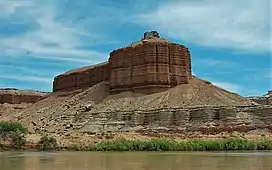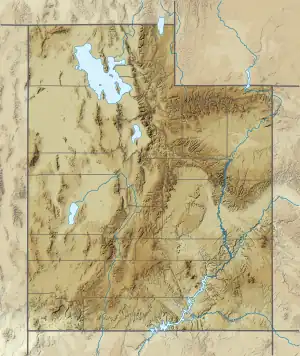Dellenbaugh Butte
Dellenbaugh Butte is a summit in Grand County of the U.S. state of Utah.[2] Dellenbaugh Butte is the 2348th highest summit in the state of Utah.[3]
| Dellenbaugh Butte | |
|---|---|
 Dellenbaugh Butte, from Green River, June 2019 | |
| Highest point | |
| Elevation | 4,395 ft (1,340 m)[1] |
| Prominence | 55 ft (17 m)[1] |
| Isolation | 2.23 mi (3.59 km)[1] |
| Coordinates | 38°49′30″N 110°06′42″W[2] |
| Geography | |
 Dellenbaugh Butte Location in Utah  Dellenbaugh Butte Dellenbaugh Butte (the United States) | |
| Location | Grand County, Utah, US |
| Parent range | Colorado Plateau |
| Topo map | USGS Green River SE |
| Geology | |
| Age of rock | Late Jurassic |
| Type of rock | Summerville Formation |
Description
Dellenbaugh Butte has the name of Frederick Samuel Dellenbaugh (1853–1935), an explorer.[4] Dellenbaugh was an artist and assistant topographer with Major John Wesley Powell's expedition when Powell camped at this location along the Green River. The butte is primarily composed of the Summerville Formation, which consists of distinctive, thin beds of shale, siltstone, and sandstone.[5]
Climate
According to the Köppen climate classification system, it is located in a Cold semi-arid climate zone, which is defined by the coldest month having an average mean temperature below −0 °C (32 °F) and at least 50% of the total annual precipitation being received during the spring and summer.[6] This desert climate receives less than 10 inches (250 millimetres) of annual rainfall, and snowfall is generally light during the winter. Spring and fall are the most favorable seasons to visit.
See also
References
- "Dellenbaugh Butte - 4,395' UT". listsofjohn.com. Retrieved 2020-11-13.
- "Dellenbaugh Butte". Geographic Names Information System. United States Geological Survey, United States Department of the Interior. Retrieved 2020-11-16.
- "Dellenbaugh Butte". Peakery.com. Retrieved 5 November 2016.
- Leigh, Rufus Wood (1961). Five hundred Utah place names: their origin and significance. Salt Lake City: Deseret News Press. p. 18.
- USGS.gov
- Peel, M. C.; Finlayson, B. L.; McMahon, T. A. (2007). "Updated world map of the Köppen−Geiger climate classification". Hydrol. Earth Syst. Sci. 11. ISSN 1027-5606.
External links
- Weather forecast: Dellenbaugh Butte